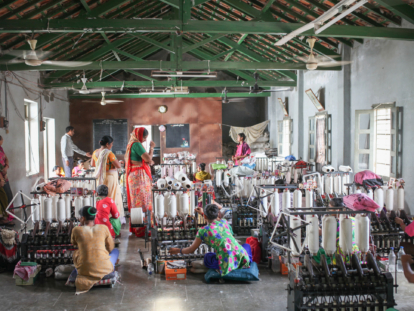Freedom through Fabric
Why a symbol of Indian self-reliance is vital again.
All photos by Sara Otto
Mahatma Gandhi’s legacy is often remembered in objects.
His humble dhoti outfit was a deliberate way to build kinship with India’s impoverished communities. Food—also the lack of it—was at the center of his iconic hunger strike, a part of Gandhi’s “Quit India” movement protesting Britain’s colonization. Salt inspired a 250-mile march against a salt tax. Each object was a symbol of nonviolent resistance. But according to Gandhi, there was one object that best encapsulated his ideology and India’s path to independence. “For me,” Gandhi is reported to have said, “nothing in the political world is more important than the spinning wheel.”
He meant the charkha, a hand-operated device used to spin fibers into yarn to make cloth called khadi, a lightweight, breathable fabric traditionally made with cotton. During Gandhi’s era of activism in the early 1900s, he transformed it from a craft passed down through generations into a tool of protest against British colonizers who had long exploited Indian cotton harvests. Khadi could be a path to self-reliance for Indians. (Some accounts even say that he called khadi spinners “freedom fighters.”)

At Udyog Bharti, an artisan hand-spins naturally dyed cotton thread that will serve as the base for khadi. The charkha wheel, used to make khadi, quickly became a symbol of self-reliance in the early 1900s. An image of the tool was even once rendered on the Indian flag.
After a nearly 300-year rule, the British finally exited India in 1947, and the Indian government recognized khadi more officially. In 1956, they formed the Khadi and Village Industries Commission Act (KVIC) to regulate the cottage industry and its many manufacturing cooperatives across India. The craft continues today, typically in small workshops or in the homes of artisans—usually women and usually in rural communities—where traditional marigold flower garlands line doorways, cups of chai sit next to charkhas and neighborhood cats visit during the day.
That history, craftsmanship, and the social and financial opportunities for these workers is what most excited Patagonia about working with khadi artisans. And after nearly six years, we’ve introduced our first khadi handwoven collection, naturally dyed organic cotton clothing for men and women made by 117 artisans located in villages across the Indian state of Gujarat. Starting with 100 percent organic cotton grown and harvested in India, our khadi material is hand-spun using a metal charkha and hand-dyed with natural indigo before it’s cut and sewn in a factory.
“Khadi is another step in the story of social responsibility,” says Helena Barbour, who leads Life Outdoors at Patagonia. “It’s about valuing product and human touch—elements that have gotten lost in a world of fast fashion.”
Handcrafted apparel may be the antithesis to fast fashion in some ways, but it can be plagued with many of the same problems—abysmal pay, child labor, dangerous work conditions. When we began our search for the right supplier, we knew our typical vetting process wasn’t set up for this type of small-scale production. Informal work environments are often decentralized with little to no documentation. That lack of structure isn’t necessarily intentional. It’s how business has been done for decades.
“How do you get these subcontractors who have never been asked to do anything around compliance to now be open to set wages, checking for child labor and monitoring all of these practices?” asks Sarah Hayes, head of material development at Patagonia. “Compliance is often not the hardest part. It’s the habit- and mindset-changing.”
We wanted to be confident that we were working with supply chain partners who aligned with our goals of providing artisans with safe, equitable conditions and long-term support. So we reached out to Nest, a nonprofit that created a seal of approval to ensure the well-being of artisans and bring visibility to global handcraft economies.

Handloom weaver Kankuben Mansukhbhai Manvar works from her home in a rural village in Gujarat, India. Her husband, a master weaver in their community, taught Manvar the craft that she’s now been practicing for decades. Together, they take turns at the loom to create khadi.

Left: At an Udyog Bharti workshop in Gujarat, India, artisans hand-dye cotton yarn in an indigo bath where they are turned several times and soaked to achieve a rich blue denim color.
Right: Specialized tools and equipment await handling at a production center in the village of Rajkot.
“In different cultural environments, home- or craft-based work is seen as ancillary labor,” says Benita Singh, chief communications and advocacy officer at Nest. “Some producers may think, ‘This is work that artisans are doing from their homes, so we’re going to give them some money. They’re not coming into work so it’s additional income.’ Nest’s Ethical Handcraft program is educating business owners on the fact that people have been working from home for centuries, and it is still within their basic economic and human rights to earn a fair wage for their work. The handworkers creating and producing from home—predominantly women—are not always educated on the protections they should be entitled to, whether it’s health and safety protections or signing wage records for piece-rate labor.”
Patagonia first partnered with Nest in 2014 as one of the founding brands to help form The Nest Ethical Handcraft Program before it formally launched in 2017. Nest knew most artisan businesses aren’t trained in compliance, so they devised an 18-to-24-month educational and training program before the auditing process. Those that meet the required threshold earn the Nest Seal. In total, there are 100 compliance standards across five categories: worker rights and business transparency, child advocacy and protection, fair compensation and benefits, health and safety, and environmental care.
Patagonia didn’t have to look far for its partner. One of our longtime suppliers in India, Arvind Ltd., started making khadi denim a decade ago, working with KVIC-led cooperative Udyog Bharti since 2013. Arvind had been looking to infuse more structure and equity into this informal economy, too. When we approached them with the Nest program, they helped streamline and align the different stakeholders—brand, supplier, government and artisans.
Arvind passed their audit in 2019 after just the first assessment—which is more exception than norm—but the relationship continues even after the audit. Nest runs an annual survey with each artisan to gauge the program’s impact. In last year’s Worker Well-Being survey, 100 percent of women artisans interviewed by Nest—including the roughly 100 women who work in Arvind’s supply chain—said they’re able to support their children’s formal education through their craft income and 94 percent felt their decision-making ability in their households increased because of their employment. Artisans usually prioritize new housing, education and healthcare. Some have also been able to buy smartphones, motorcycles for transport and pay for their own weddings. And since workers are paid by output versus set hours, they’re afforded crucial flexibility to care for their children and homes on their own schedules.
“This is a craft whose value goes much deeper than just stuff,” Barbour says. “It’s empowerment.”
But as Arvind’s Head of Sustainability Abhishek Bansal explains, despite the historical and emotional significance, times change, styles change and so does interest. About 10 years ago, demand for khadi was dropping, and even with the government’s efforts, the art of hand-spun, hand-woven fabrics could’ve been forgotten. Pair that with peaks and lulls in production, and it became a feast-or-famine situation that left many artisans without a steady paycheck.
For small-scale businesses to succeed, it comes down to consistent, regular orders that provide workers with a dependable income. Arvind ensures a fair price is paid to Udyog Bharti, which helps the cooperative pay artisans with—what Nest has assessed—income that’s above minimum wage. Now, with renewed support from the government through KVIC, as well as brands and organizations like Nest, instead of migrating to big cities, Bansal is seeing young people join the local khadi economy.
“Arvind is pursuing a philosophy of working with artisans to revive traditional artwork by providing it with a contemporary meaning,” he says. “It’s not about scaling this to an industrial level but to support full-time artisans and give them visibility, a livelihood, engagement and also slowly upgrade their skills.”
The anti-industrial sentiment is palpable, especially in person. When Hayes and Barbour visited some of the artisan workers in 2019, the difference was staggering.
“I’ve toured a ton of factories and textile mills,” Hayes says. “You go to these huge industrial complexes, and they’re super-efficient, but they’re very noisy. There’s industrial lighting. It doesn’t necessarily spark joy. And then you go to a village where people don’t have to leave to provide for their families. It’s peaceful and quiet because it’s not all these millions of machines running, requiring tons of energy. The whole vibe is completely different.”
By its nature, the environmental impact of khadi material is lower, too. When compared to machine-spun products, the carbon intensity of our spring 2022 khadi products is 34–38 percent lower. It’s another factor that Bansal says makes this centuries-old tradition all the more relevant today.
“There is a whole 360-degree viewpoint to khadi, from the livelihood perspective to art and tradition and the environmental perspective,” he says. “The impact of khadi goes beyond the visible human impact, to the socioeconomic environment of the country. It’s going back to the philosophy of slow production and showing the world that it is still possible to sustain.”

